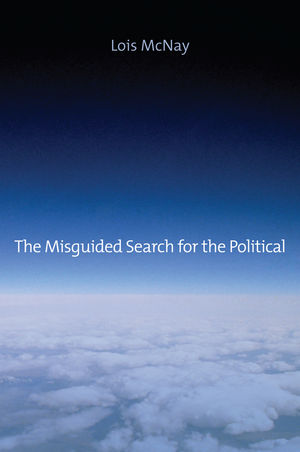 In The Misguided Search for the Political, Lois McNay argues that some theories of radical democracy tend to rely on troubling abstractions – or what she terms ‘socially weightless’ thinking. They often propose ideas of the political that are so far removed from the logic of everyday practice that, ultimately, their supposed emancipatory potential is thrown into question. Radical democratic theory should instead attend more closely to a phenomenology of negative social experience. Francesco di Bernardo recommends the book to students of politics and philosophy, after finding some fresh and insightful perspectives on radical democracy.
In The Misguided Search for the Political, Lois McNay argues that some theories of radical democracy tend to rely on troubling abstractions – or what she terms ‘socially weightless’ thinking. They often propose ideas of the political that are so far removed from the logic of everyday practice that, ultimately, their supposed emancipatory potential is thrown into question. Radical democratic theory should instead attend more closely to a phenomenology of negative social experience. Francesco di Bernardo recommends the book to students of politics and philosophy, after finding some fresh and insightful perspectives on radical democracy.
 The Misguided Search for the Political. Lois McNay. Polity.
The Misguided Search for the Political. Lois McNay. Polity.
Lois McNay’s The Misguided Search for the Political is a penetrative critique of some of the most recent theories of radical democracy. McNay focuses her attention on theories of radical democracy inspired by the work of Laclau and Mouffe, which propose an alternative to liberal democracy and neoliberalism based on participatory and inclusive democracy, and puts under scrutiny movements such as the Mexican revolutionary EZLN or Zapatistas, and more recently Occupy. Drawing from Adorno, Honneth, among others, and most importantly from Bourdieu’s theorisation of social suffering, McNay provides a critique of the social weightlessness of some of these theories. McNay’s critique rests on the idea that theorists of radical democracy have taken an ‘ontologial turn’ (p. 208) which, according to the author, obfuscates features of social inequality such as structures of oppression internalised in neoliberal societies, which crucially impede autonomous agency (p. 207).
In recent years, and in a political context defined by various radical observers as post-democracy, critical theorists have sought to theorise forms of participatory and radical democracy alternative to neoliberal political practice. McNay’s book thus intervenes timely in the debate around radical democracy and alternatives to dominant neoliberalism.
McNay is Professor of Theory of Politics at University of Oxford and Fellow of Somerville College. She has written several journal articles and books on continental social theory and feminist thought. She has also written extensively on Foucault, and in 2013 she took part in a BBC Radio 4 programme about the life and works of the French philosopher.
To give readers an overview of the content, The Misguided Search for the Political is divided into five chapters. In the first chapter, the author sets out the themes of the book. The discussion focuses on the idea of social suffering drawing from Bourdieu, and analyses the tendencies toward social weightlessness in recent radical democracy theories. The second chapter deals with Mouffe’s theory of democratic agonism, one of principal alternatives to theories of deliberation. In the third chapter, the author discusses the issue of social weightlessness in feminist political theory. A central topic of the chapter is the discussion of post-identity theories. McNay presents her arguments discussing the works of Wendy Brown and Linda Zerilli. The fourth chapter focuses on the theories of Jacques Rancière and the discourse of recognition and rights. In the fifth and final chapter, the author discusses theories of radical pluralism proposed by William Connolly and James Tully.

Returning to look at the opening chapter in more detail, here McNay reframes the concept of social suffering firstly theorised by Pierre Bourdieu, mainly in the co-authored volume The Weight of the World (1999). McNay affirms that ‘the idea of social suffering highlights the depoliticizing effects of dominations: that when objective inequalities are taken into the body and naturalized as subjective dispositions, the capacity for political agency can be subtly eroded’ (p. 28). This concept forms the core of McNay’s critique of the social weightlessness of radical democratic theories. While not disputing the validity of these theories in proposing an alternative in the context of post-democracy, McNay observes that they do not take into consideration ‘the internalization of objective structures of oppression’ (p. 37). McNay’s reformulation of Bourdieu’s theory certainly offers an important contribution to the discussion about theories and practices of radical democracy. This contribution highlights the obstacles to political participation of marginalised sectors of society. Specifically, McNay’s critique stresses how theories of radical democracy fall short of arguments when explaining why individuals in certain conditions are ‘unable to act as agents of their own interests’ (p.37) and become at times ‘complicit with their own oppression’ (p. 37).
In the second part of the first chapter, McNay integrates Honneth’s theories of recognition into the Bourdeusian discourse of social suffering. The integration of Honneth’s views on the changing nature of the labour under the flexible conditions of global neoliberal capitalism adds an insightful perspective on the discussion. Discussing Honneth’s theory of recognition, the author affirms that ‘neoliberal governance of the self […] forms part of a material reshaping of the social realm which controls individuals, not through explicit forms of domination, but through rationalized techniques and devices […] It multiplies individual freedoms in the context of a notion of responsible self-management whilst at the same time […] eroding social practices’ (p. 59). In this context, the author suggests, theories of radical democracy suffer from social weightlessness as they mainly rely on a theoretic approach which disregards the disenfranchising and disempowering effects of neoliberal governance on individuals and the consequent inability to express their agency.
The third chapter offers an important contribution to feminist political theory. It specifically addresses the issue of social weightlessness within feminist political theory. McNay’s discussion is contextualised within recent developments of feminist theory and it is specifically framed in the context of theorisation of post-identity feminism. The author, in fact, introduces her arguments discussing Nancy Fraser’s concern with ‘the co-optation into the recuperative spirit of neoliberal capitalism’ (p.101) of many of the identity-arguments of feminist theory. McNay, interestingly affirms that ‘many of its progressive ways of thinking about identity have been de-radicalized in so far as they have become elements of a neoliberal governance of the self that promotes women’s autonomy whilst simultaneously enmeshing it within a reconfigured disciplinary matrix’ (p. 101). The author subsequently discusses Foucauldian and Arendtian approaches to politics of suffering (p. 103). The sections dedicated to this subject are certainly among the most interesting points discussed not only in the chapter but in the whole book. The author subsequently discusses the theories of Brown and Zerilli and concludes by affirming that following Boudeau, Foucault, Fraser, it appears clear that the most insidious effect of neoliberal capitalism resides ‘in the depoliticizing governance of the self’ (p.131) and that therefore questions of subject, identity and agency should have a renewed ‘significance in feminist political thought about freedom’ (p. 131).
McNay’s new book is an original contribution to the discussion of radical democracy and also radical critique of these theories. It is a thought-provoking work that aims to ground theory of radical democracy into its practice. It is a work addressed to a specialist audience interested in recent developments and discussions in political theory.
————————————–
Francesco Di Bernardo holds a PhD in Modern and Contemporary Literature, Culture and Thought from the University of Sussex. He is interested in the relationship between literature and history, economics, sociology and politics, and in critical theory. He is one of the founders of the project Sussex Latin America, and has worked as Associate Tutor at the School of English and as a Research Support Assistant for the School of Media, Film and Music at Sussex. Read more reviews by Francesco.






